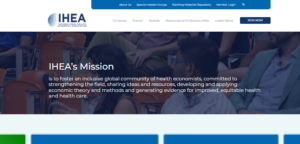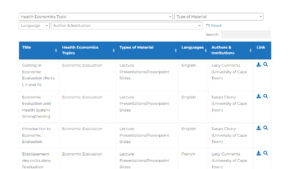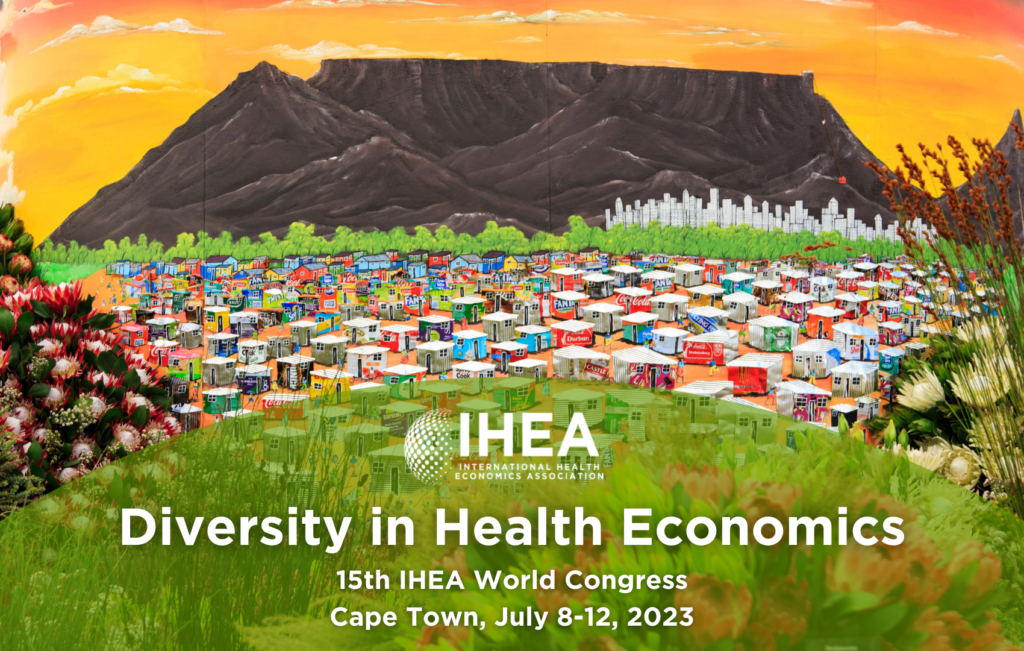President’s Message |
It is both a privilege and a pleasure to have assumed the position of IHEA President this year and to have had the opportunity in that capacity to engage with members, stakeholders, the Board, and the Executive team. I am grateful to be following in the footsteps of Winnie Yip who will, in her role as Past President, continue to contribute to the leadership team and advance a number of activities, and the late Adam Wagstaff who leaves a long intellectual legacy in the organization not to mention as a friend, and mentor.
It is customary for the President to lay out broad areas of focus for their term, so I have taken some time to reflect on the many contributions of my predecessors in this regard and consider IHEA’s potential role in the field going forward.
The superbly successful online 2021 IHEA Congress, whose format was necessitated by the COVID pandemic, presented a number of opportunities for insight and reflection. The Congress with its theme of ‘Health Economics in a Time of Global Change’ highlighted areas in our field that will likely be at the forefront of research efforts for years to come such as notions and measurement of equity in health and health care and mechanisms designed to address inequities. Not surprisingly, methodological and technical advances were on display–including the application of AI and machine learning and the use of a broader array of data sources (e.g., mobility image data and many others). Fortunately, we have in our community of scholars, individuals whose work has laid a solid foundation in these and many other areas, which positions us very well as a field. IHEA too can play an important role in supporting the community of economists working in health-related areas in their work to advance the science, building the body of research evidence, and informing policy design and implementation. In this spirit, an area of focus for my term will be on supporting skills development for students and emerging and established scholars and practitioners. At our Congresses and activities in between, such as workshops, our Special Interest Groups (SIGs), pre-Congress sessions, panels, etc. we will aim to bring our members access to the very latest in the development and application of econometric and economic evaluation methods.
We will also rejuvenate a focus on the cutting edge of theoretical advances in the field which are bringing many insights from related fields in economics, i.e., IO, environmental, risk and uncertainty, etc.
If there has been a silver lining to the COVID-19 pandemic for the IHEA community, one element would surely be the potential to use virtual modes of communication to a greater effect to connect more broadly and more deeply with our community. It has allowed us over the last couple of years to engage more frequently with scholars, students, and policymakers from a wider array of countries and organizations. This has undoubtedly enriched the quality of engagement with the pressing issues of our time and supported work that is likely to have a greater impact. Another focus, therefore, will be to support and further build upon ways to enrich engagement using virtual technologies, particularly in areas related to training support for students, junior and senior scholars from LMICs e.g., internships, mentorships, training labs, etc.
As a community of economists, and as citizens, many of us have come to the recognition that if our field is to advance in meaningful ways, if it is to remain relevant to generations that follow, we must do more to enhance the diversity of our community so that our members reflect the composition of the world around them. I have noted some mechanisms above designed to enable engagement with individuals with whom and parts of the world with which we need to have stronger ties. An area in which I would like to build is the strengthening of engagement and collaborative activities with existing communities of scholars in health economics-related associations. We are already well placed to do this as IHEA has on its Board and in its membership, leading scholars representing and who are part of health economics organizations from regions around the world. I had the honour of delivering some remarks at the opening of the 2022 African Health Economics and Policy Association conference, which not surprisingly, was a superb gathering of scholars doing high-impact research and who are engaged with colleagues internationally. I was inspired to do more to support collaboration with our affiliated associations in ways that allows us to further enrich the global health economics community and enables the participation of economists interested in health, wherever they may reside.
IHEA as an organization is not unaffected by global policy discussions and social movements and it too has been listening in respect of issues related to equity, diversity, and inclusion and what we as a community can do to improve. One key element of that reflection was to revisit our Mission and Strategic goals to ensure our guiding framework truly embodied and reflected values grounded in the principles of equity, diversity, and inclusion. One outcome was that our Mission has been re-stated to say that it “is to foster an inclusive global community of health economists, committed to strengthening the field, sharing ideas and resources, developing and applying economic theory and methods and generating evidence for improved, equitable health and health care.” Our Strategic goals encourage us to continue to strive. Our goals are to 1) Promote excellence in health economics research and teaching; 2) Promote international engagement and collaboration among health economists, and 3) Expand the profession and its impact. You can find more information about our Mission, Strategic Goals, and member resources at our newly revamped website HERE.
Over the course of the pandemic, I have been humbled and impressed by the contributions of health economists including IHEA members from around the world, many of whom re-oriented programs of research to generate timely evidence and provide policy advice to help governments and planners mitigate negative health and economic effects on the population-especially the most vulnerable. We at IHEA are duly proud to be able to work in support of the health economics community and to be able to
provide fora for the exchange of knowledge and ideas so we are well equipped as a profession to face whatever challenges may lie ahead.
We look forward to connecting with all of you over the coming months and to our coming together in Cape Town in 2023.
Best wishes,
Audrey Laporte
Our New Website
As you may have seen, or read in the above President’s message, IHEA has launched a brand new website (on our same URL: healtheconomics.org).

We are thrilled about the changes we have made to our Teaching Materials Repository that is open to members and non-members alike. You are now able to easily search all materials and download them directly from the repository.

We have also revamped our Special Interest Group pages, our upcoming events and all of our resources!
We encourage you to spend some time navigating the new website. Any questions or feedback can be sent to ihea@healtheconomics.org.
If you are an IHEA member, you can access the member back-end by clicking “member login” on the top banner and then resetting your login (your username remains the same) – more information will be sent in the coming days on accessing the member back-end and its functionality!
Congress News |
Congress abstract submission system to open soon: Call for abstracts
IHEA is pleased to invite you to join us in Cape Town in July 2023 for the 15th World Congress on Health Economics, which has the theme of Diversity in Health Economics. IHEA Congresses are well established as the forum to engage around the latest research findings in health economics from around the world, the implications of this research for health policy and practice, and new methodological developments in the discipline.
We would like to encourage health economists to make submissions in the form of an individual abstract or an organized session. Abstract submissions are due to open in August and will close on November 29th, 2022.
Abstracts should be a maximum of 500 words and should focus on research that is yet to be published. Organized sessions should take the form of an integrated set of 3-4 presentations; the inclusion of one or more formal discussants is encouraged. Proposals for organized sessions should include a description of the session (maximum of 750 words), including how participant discussion will be promoted, as well as a 500-word abstract for each paper that will be presented.
To foster diversity and promote the submission of high-quality abstracts, each person will be restricted to submitting only two abstracts where they are the presenter. This could include:
- Two individual abstracts;
- One individual abstract and one as part of an organized session; or
- Presentations as part of two organized sessions.
Abstract submitters will be asked to identify the most relevant health economics primary field and sub-fields to which their research relates. This allows us to ensure that every submission is reviewed by appropriate experts in those sub-fields and that sessions are organized to include similar topics.
Submissions will be reviewed by the Scientific Committee and the outcomes of the review process will be announced in early March 2023.
Information on the health economics fields, sub-fields, and other aspects of abstract submission is available here.
For any inquiries about the submission process please contact events@healtheconomics.org.
We look forward to having you participate in our congress in Cape Town next year.
Call for Expressions of Interest in Serving as an Abstract Reviewer
IHEA is currently seeking expressions of interest from experts in Health Economics to serve on the Review Panel of the Scientific Committee for the 2023 IHEA Congress.
We are looking for abstract reviewers with research expertise covering the full spectrum of fields within health economics. These broad fields are:
- Health, its distribution, and its valuation
- Health beyond health care services: social and related determinants
- Health beyond health care services: health behaviors
- Demand and utilization of health care services
- Supply and regulation of health care services and products
- Health care financing and expenditures
- Economic evaluation of health and care interventions
- Health system performance
- Cross-cutting themes and other issues
Full details of the sub-fields within each of these fields can be found here. Those expressing an interest in serving on the Review Panel will be requested to identify the primary field and several sub-fields in which they have the expertise, so you are encouraged to review the list of sub-fields before completing the application form.
While some of the members from the previous Scientific Committee will be returning for the 2023 Congress, the plan is to have a mixture of members with varying tenures to ensure continuity in the operations of the Scientific Committee while providing opportunities for all members to participate and contribute to the success of the IHEA Congresses. Review Panel members will normally serve for three consecutive Congresses.
IHEA would like to especially encourage mid-career researchers to express an interest in serving on the Scientific Committee Review Panel. Final decisions on membership of the panel will need to accommodate gender and geographic diversity as well as provide adequate coverage of the broad fields and sub-fields. Expressions of interest should be submitted online here.
Please note: If you served on the Scientific Committee for the 2021 congress, you should not complete this form; you will be contacted directly to find out if you are willing to continue serving on the Review Panel.
Expressions of interest for the Review Panel close on September 26, 2022.
Program to Support Early Career Researchers (ECRs) In Low- And Middle-Income Countries (LMICs) In Submitting Competitive Abstracts
IHEA will once again be offering support to early career researchers (ECRs) in low- and middle-income countries (LMICs) who do not have access to senior colleagues at their institution. LMIC ECRs can submit a draft abstract by late September. A team of established health economists will review each abstract and provide detailed feedback on how the abstract can be improved by late October, to allow researchers to finalize and submit their abstracts before the main submission deadline of November 29, 2022.
Those who would like to apply for such support should fulfill the following basic criteria:
- Must have graduated with their highest degree within the last five years;
- Must be a citizen of, and working or studying in, a LMIC; and
- The abstract must be on research undertaken in a LMIC.
As the purpose of this initiative is to provide support to LMIC ECRs who do not have access to senior collegial support, applicants should also fulfill the following criteria:
- If currently studying at a university in a high-income country, the abstract should not be for research that is being undertaken as part of their Masters or PhD for which they are receiving supervisory support;
- Be working in an institution that does not have senior health economics staff;
- The abstract should not have established health economists as co-authors.
Before drafting an abstract, please watch the recording of the webinar on “Successful Abstract Writing – Tips for the IHEA Congress”. This very helpful video recording is available in:
English (click here);
French (click here); and
Spanish (click here).
Abstracts should be a maximum of 500 words and should be submitted, and the application form completed, here by September 26, 2022.
LMIC ECRs who participate in the abstract support program, and whose abstract is selected by the Scientific Committee for presentation at the 2023 Congress, will be offered support in preparing their oral or poster presentation.
Call For Experienced Health Economists to Volunteer to Contribute Your Time to the LMIC ECR Abstract Support Program
If you are an experienced health economist, we are sure that you support your Masters and Doctoral students, and less experienced staff in your Department, by reviewing their draft conference abstracts and advising them on how to improve them. Many early career researchers (ECRs) in Low- and Middle-Income countries (LMICs) have no access to such senior collegial support.
If you are able to spare some time during October 2022, we would be most grateful if you would volunteer to assist in reviewing draft abstracts from LMIC ECRs and commenting on how they could be improved. Please volunteer by providing your contact details and indicating your major areas of research expertise here – please see a list of primary health economics research fields here.
ECR SIG Webinar – Rescheduled
The ECR SIG webinar on identifying an appropriate research question was originally scheduled for the 7th of July but was unable to go ahead due to technical difficulties. This webinar is being rescheduled and a new date will be announced soon. We apologise to those who registered to attend on the 7th of July and hope you can attend the rescheduled webinar.
Update on Mentoring Program: Webinars for future mentors and mentees |
With the highest number of mentor and mentee applications yet, IHEA will offer mentor and mentee webinars for those participating in the next round of its mentoring program. This will give everyone the opportunity to learn about their roles and the structure of the program. The webinars will also provide a platform to ask questions and get insights from experienced mentors. More information will be sent to mentors and mentees directly shortly before the webinars, planned for late August.
Upcoming Webinars |
Prioritising Genomic Medicine
When: Tuesday, September 6, 2022, at 6:00 pm EDT
Presenters: Scott Grosse, Sarah Norris, Li Yang, Brock Schroeder
Genomic medicine is rapidly changing the healthcare paradigm for multiple conditions, including cancer and rare diseases. With governments around the world increasingly investing in genomics research and implementation into clinical practice, and with the health economics evidence base on genomic medicine expanding, it is important to reflect on the role of health economics to change policy and clinical practice for genomic medicine.
Against this background, we are pleased to present the first symposium of the Economics of Genomics and Precision Medicine (Econ-Omics) SIG. The symposium will take place online between 1800-2015 EST on Tuesday 6th September and will consist of the following:
- an introduction (1800-1810)
- a panel discussion (1810-1925)
- a short break (1925-1930)
- then a workshop (1930-2015)
The symposium will begin by bringing together four experts for a panel discussion centred on the symposium title. The panelists are all specialists in health economics and genomics who will reflect on their experiences when generating health economic evidence across multiple jurisdictions for prioritising genomic medicine. Panelists will outline key challenges, critical elements for success when undertaking research in this space, and visions for the future.
A particular challenge is how to encourage and facilitate international collaborations going forward in this research space. The panel discussion will therefore be followed by a facilitated discussion in a workshop setting with early career researchers and researchers from low- and middle-income countries. The aim of this workshop is to ensure that the SIG takes forward high value activities for supporting capacity building in health economics of genomic medicine.
The Symposium will be facilitated by the conveners of the SIG. The four panelists will be:
- Scott Grosse, Centers for Disease Control and Prevention, USA
- Sarah Norris, Associate Professor, University of Sydney, Australia
- Li Yang, Associate Professor, Peking University, China
Brock Schroeder, Vice President, Market Access, Illumina Inc., USA.
Preferences for Adjuvant Immunotherapy in Resected Stage III Melanoma
When: Monday, September 12, 2022, at 6:00 PM EDT
Presenter: Ann Livingstone, University of Sydney
Ann was recently awarded her PhD. She has a keen interest in patient preferences in trial-based and modelled economic evaluation. In addition, she works as an evaluator for the Australian Medical Services Advisory Committee, reviewing and critiquing evidence to inform government policy decision-making regarding health technologies.
Adjuvant immunotherapy has revolutionised the management of resectable melanoma, substantially reducing the chance of recurrence but at the risk of immune-related adverse events (AE). However, the choice of adjuvant (additional) treatments can be contentious.
A discrete choice experiment (DCE) included respondents with resected stage III melanoma considering or having received adjuvant immunotherapy. Respondents chose between twelve randomly presented choice tasks of two alternative options (adjuvant immunotherapy versus observation without adjuvant immunotherapy). The two options varied across two-three levels of six attributes: chance of 3-year melanoma recurrence, mild, permanent, or fatal AE, drug regimen, and out-of-pocket costs.
This presentation will discuss the results of respondents’ preferences for adjuvant immunotherapy as a treatment for stage III resected melanoma.
Financing PHC in LMICs: Putting People at the Centre
When: Tuesday, September 13, 2022, at 7:00 AM EDT
Presenters: Kara Hanson, Tim Powell-Jackson, Triin Habicht, Shankar Prinja
In this webinar, we are going to present the findings from our Lancet Global Health Commission on Financing PHC report on two key issues: Resource Allocation and Provider Payment. We will also present two country case studies from India and Estonia to illustrate the problems and potential solutions.
Past Webinar Recordings |
Did you know…all past IHEA webinar recordings can be found on our YouTube Channel here!
You can access them all on our SIG pages as well.



